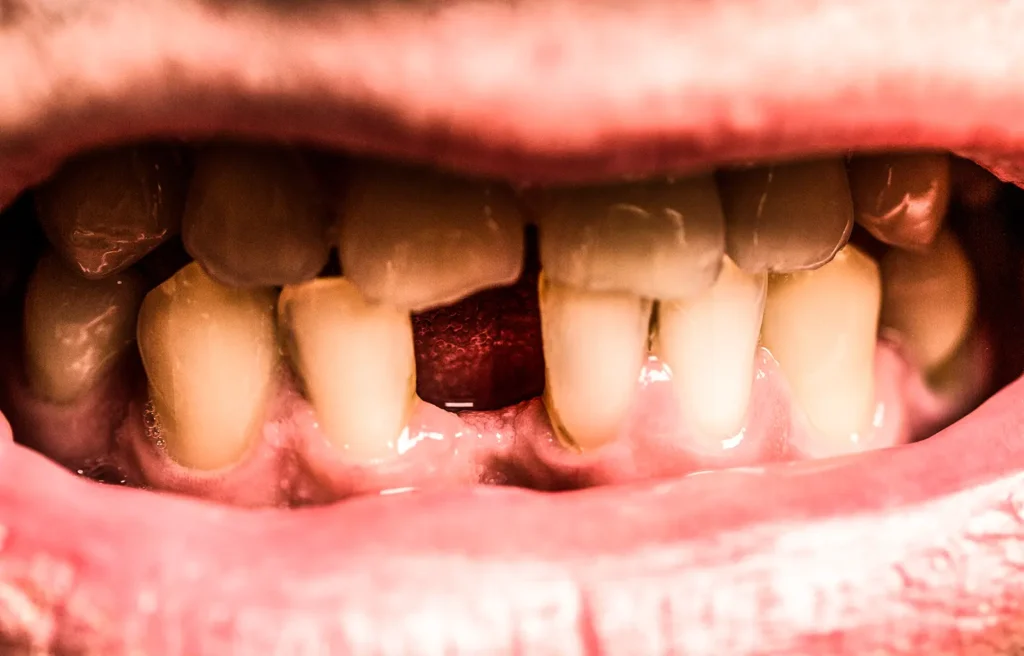Table of Contents
Tooth loss is a common issue that affects millions of people worldwide. Whether due to decay, injury, or disease, losing a tooth can have significant consequences for your oral health, self-confidence, and overall well-being. Fortunately, modern dentistry offers a range of solutions to address this problem, with dental implants being one of the most effective and long-lasting options. This article will explore the causes of tooth loss, the negative effects it can have on your life, and how dental implants can provide a solution. This information is particularly relevant for patients of Dr. Josh Muir and Dr. Tanner Townsend at Montana Center for Implants and Dentures, where we are committed to helping you restore and maintain a healthy, beautiful smile.

Causes of Tooth Loss
Understanding the common causes is the first step in preventing it and seeking appropriate treatment. Here are some of the most prevalent reasons people lose their teeth:
Gum Disease (Periodontal Disease)
- Overview: Gum disease is the leading cause of tooth loss in adults. It is a chronic inflammatory condition that affects the gums and the bone supporting the teeth. The early stage, known as gingivitis, causes gums to become red, swollen, and prone to bleeding. If left untreated, it can progress to periodontitis, leading to the destruction of the bone and tissues that hold teeth in place.
- Prevention: Regular dental check-ups, proper oral hygiene, and timely treatment of gum disease are essential to preventing tooth loss related to this condition.
Tooth Decay (Cavities)
- Overview: Tooth decay is another major cause of tooth loss. When plaque builds up on teeth, it produces acids that erode the enamel and create cavities. If a cavity is not treated in its early stages, it can penetrate deeper into the tooth, eventually reaching the pulp and causing infection. This can result in the need for extraction if the tooth cannot be saved through other means.
- Prevention: Brushing and flossing daily, reducing sugar intake, and visiting your dentist regularly for cleanings can help prevent tooth decay.
Trauma or Injury
- Overview: Accidents and injuries can lead to tooth loss, especially if the impact is severe enough to damage the tooth beyond repair. Sports injuries, falls, and car accidents are common causes of traumatic tooth loss.
- Prevention: Wearing mouthguards during sports and taking precautions to protect your teeth in high-risk situations can help prevent traumatic tooth loss.
Poor Oral Hygiene
- Overview: Inadequate oral hygiene practices can lead to both gum disease and tooth decay, increasing the risk. Neglecting to brush, floss, and visit the dentist regularly allows plaque and bacteria to accumulate, causing damage to your teeth and gums over time.
- Prevention: Establishing and maintaining a consistent oral hygiene routine is crucial for prevention.
Genetics
- Overview: Some people are genetically predisposed to certain conditions that increase the risk of tooth loss, such as weak enamel, gum disease, or bone loss. While you cannot change your genetics, being aware of your risk factors can help you take proactive steps to protect your teeth.
- Prevention: Regular dental check-ups and personalized care plans can help manage the risk of tooth loss due to genetic factors.
Negative Effects of Tooth Loss
Losing a tooth can have a wide range of negative effects, both physically and emotionally. Understanding these consequences highlights the importance of seeking timely treatment.
Impact on Oral Health
- Bone Loss: When a tooth is lost, the jawbone in that area begins to deteriorate due to the lack of stimulation from the tooth root. This can lead to significant bone loss over time, which may affect the structure of your face and make it more difficult to place dental implants in the future.
- Shifting Teeth: The remaining teeth may shift out of place to fill the gap left by the missing tooth. This can lead to misalignment, bite problems, and further oral health issues.
- Increased Risk of Decay and Gum Disease: Gaps created by missing teeth can become traps for food particles and bacteria, increasing the risk of tooth decay and gum disease in the surrounding teeth.
Aesthetic and Functional Impacts
- Appearance: Tooth loss can have a significant impact on your appearance. Missing teeth can cause the surrounding facial structure to collapse, leading to a sunken, aged look. Additionally, gaps in your smile can affect your self-confidence and how you interact with others.
- Speech: Teeth play an important role in speech. Missing teeth, especially in the front of the mouth, can cause difficulty in pronouncing certain words and sounds, leading to speech impediments.
- Chewing and Digestion: Losing a tooth can make it difficult to chew food properly, leading to changes in your diet and potential digestive issues. You may find yourself avoiding certain foods, which can impact your nutrition and overall health.
Emotional and Psychological Effects
- Self-Esteem: The appearance of your smile can significantly affect your self-esteem. Tooth loss may cause embarrassment or self-consciousness, leading to a reluctance to smile, socialize, or engage in public speaking.
- Quality of Life: The combined physical, aesthetic, and emotional impacts of tooth loss can decrease your overall quality of life. You may experience frustration, anxiety, or depression related to the loss of your teeth and its effects on your daily life.

Solutions with Dental Implants
If you’ve experienced tooth loss, you may be wondering, how can I fix my teeth? Dental implants offer a reliable, long-lasting solution that addresses both the functional and aesthetic aspects of tooth loss. Here’s why they are an excellent option:
What Are Dental Implants?
- Description: Titanium posts are surgically placed into the jawbone to act as artificial tooth roots. Once the implant has integrated with the bone, a crown is attached to the top, creating a natural-looking and fully functional replacement tooth.
- Versatility: Replacement of a single tooth, multiple teeth, or even a full arch of teeth, depending on your needs. They are highly versatile and can be customized to match your natural teeth.
Benefits of Dental Implants
- Permanent Solution: Unlike dentures or bridges, which may need to be replaced or adjusted over time, dental implants are designed to last a lifetime with proper care. They are a permanent solution that can restore both the function and appearance of your smile.
- Prevents Bone Loss: One of the most significant advantages is they help prevent bone loss in the jaw. The implant stimulates the jawbone, much like a natural tooth root, preserving bone density and preventing the sunken facial appearance that often accompanies tooth loss.
- Natural Look and Feel: They’re custom-made to blend seamlessly with your natural teeth. They look, feel, and function just like real teeth, allowing you to eat, speak, and smile with confidence.
- Improved Oral Health: Unlike traditional bridges, which require the alteration of adjacent teeth, these do not affect surrounding teeth. This helps preserve the health of your natural teeth and reduces the risk of future oral health issues.
The Dental Implant Process
- Initial Consultation: The process begins with a comprehensive consultation with Dr. Josh Muir and Dr. Tanner Townsend at Montana Center for Implants and Dentures. During this visit, our team will assess your oral health, take X-rays, and discuss your treatment options.
- Implant Placement: If you’re a candidate for dental implants, the next step is the surgical placement of the implant into the jawbone. This is typically done under local anesthesia, and the implant is left to heal and integrate with the bone over several months.
- Abutment and Crown Placement: Once the implant has fully integrated, an abutment is attached to the top of the implant. A custom-made crown is then placed on the abutment, completing the restoration.
- Recovery: The tooth implant recovery time varies from person to person, but most patients can expect to resume normal activities within a few days of the procedure. Full healing and osseointegration can take several months, during which time you’ll need to follow Dr. Josh Muir and Dr. Tanner Townsend’s instructions for care.
Maintaining Dental Implants
- Oral Hygiene: Dental implants require the same level of care as natural teeth. Regular brushing, flossing, and dental check-ups are essential to maintaining the health of your implants and preventing complications.
- Healthy Lifestyle: A healthy diet, avoiding smoking, and limiting alcohol consumption can all contribute to the long-term success of your dental implants.
- Regular Check-Ups: Regular visits to Montana Center for Implants and Dentures will ensure that your implants are functioning properly and that your oral health remains in optimal condition.
Conclusion
Tooth loss can have far-reaching consequences for your oral health, appearance, and overall quality of life. However, it doesn’t have to be a permanent problem. With dental implants, you can restore your smile, regain full functionality, and protect your oral health for years to come.
At Montana Center for Implants and Dentures, we are dedicated to helping you find the best solution. Our dental expert team is here to guide you through every step of the process. With our expertise and personalized care, you can achieve a beautiful, healthy smile that lasts a lifetime. Don’t let tooth loss hold you back—discover the transformative benefits of dental implants today.




